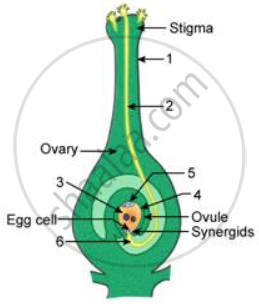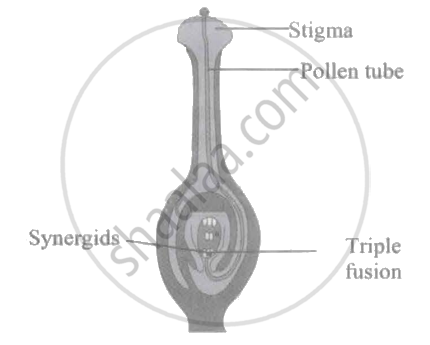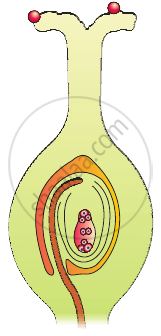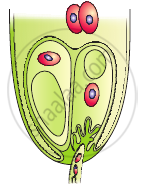Advertisements
Advertisements
प्रश्न
Which is the triploid tissue in a fertilised ovule? How is the triploid condition achieved?
उत्तर
The triploid tissue in the ovule is the endosperm. Its triploid condition is attained due to the fusion of two polar nuclei and one nucleus of male gamete (also referred to as triple fusion).
APPEARS IN
संबंधित प्रश्न
(a) Explain the events after pollination leading to the formation of a seed in angiosperms.
(b) Mention the ploidy levels of the cells of different parts of an albuminous seed.
Name of the part of the ovary which gives rise to:
Seed ______
Give one word/term for the following:
When pollen grains of a flower reach the stigma of the same flower.
What happens to the following after fertilization?
Stamens
Given ahead is a diagrammatic representation of the process of fertilization. Study the same and then answer the question that follows:

What happens to
i) Ovary
ii) Ovule after fertilisation
What is ‘double fertilization’? Describe it with the help of a neat and well-labeled diagram. Give its importance.
What is ‘double fertilization’? Describe it with the help of a neat and well-labeled diagram. Give its importance.
Even though each pollen grain has 2 male gametes, why at least 20 pollen grains are required to fertilize 20 ovules in a particular carpel?
Describe the process of double fertilization.
Which of the following represent megagametophyte
Define triple fusion.
‘Pollination in Gymnosperms is different from Angiosperms’ – Give reasons.
From the following identify the fate of the male gametes discharged in the synergid.
What would be the number of chromosomes in the megaspore mother cell of the plant if an endosperm of an angiosperm has 24 chromosomes?
Through which route the pollen tube can enter the ovule?
Following diagram represents double fertilization. Identify the INCORRECT label.

______ have the smallest seeds in the plant kingdom.
In the diagram given below, show the path of a pollen tube from the pollen on the stigma into the embryo sac. Name the components of egg apparatus.

In the figure given below label the following parts: male gametes, egg cell, polar nuclei, synergid and pollen tube

What is Siphonogamy?
